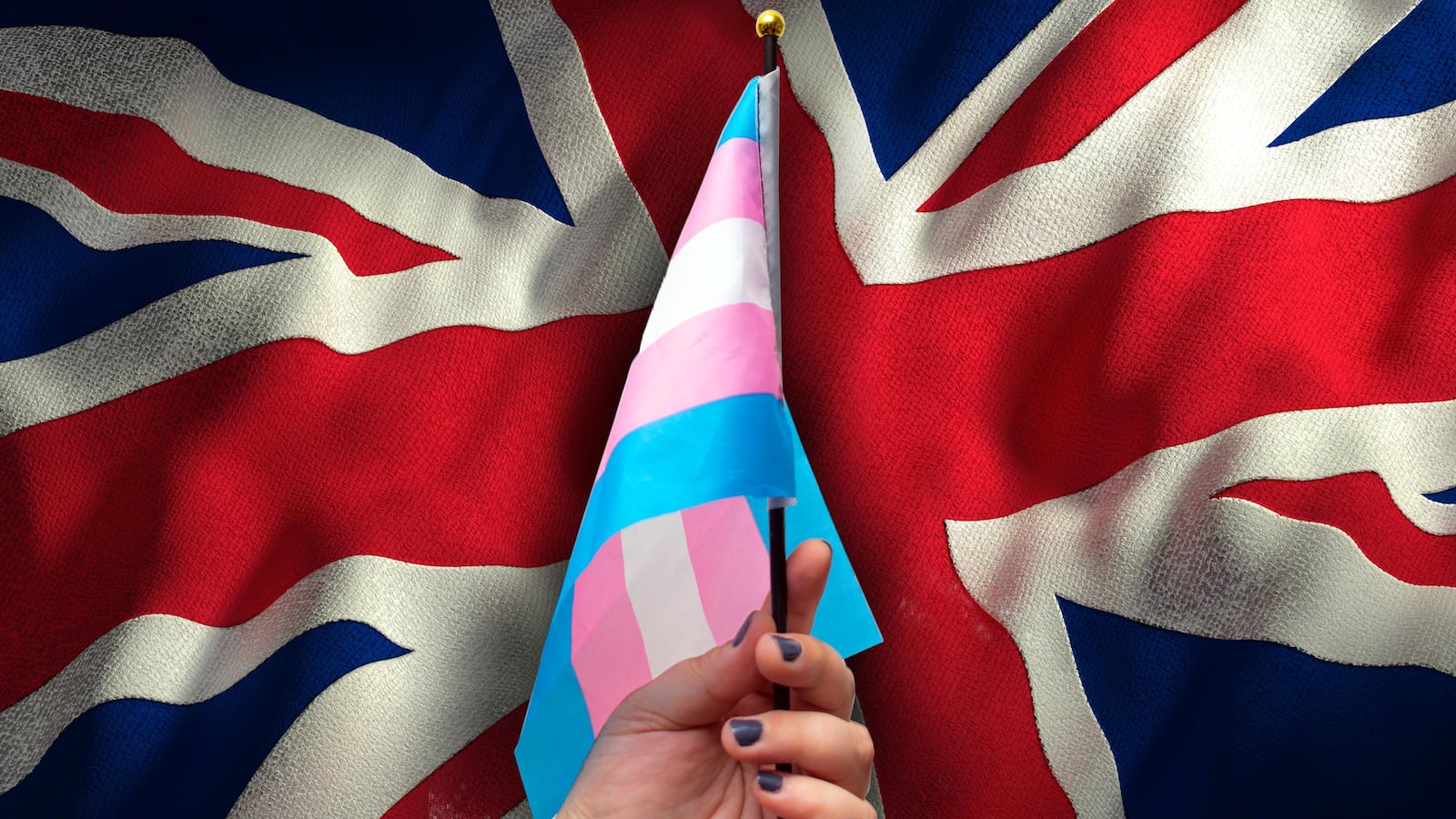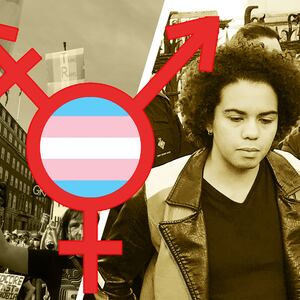Almost every trans person I know tells me the same things: “I can’t read or watch the news any more” … “I’ve had to go onto meds just to function” … “I don’t feel safe anywhere” … “I’m afraid every time I leave the house” … “I’m thinking about moving” … “We’re going to live abroad.”
Opinions differ as to the exact moment that the world lurched and the lives of trans people in the U.K. began rapidly to slide into an unbearable daily onslaught of lies, hatred, discrimination and violence, yet as we come to the end of 2020 that’s where we are.
Around the time that Trump and Brexit arrived in our nightmares a culture war was ignited over the human rights of trans people, a war that trans people didn’t want and where the forces ranged against them included not just the usual ranks of the religious right, the far right and antediluvian social conservatives, but U.K. Government ministers and an astonishingly transphobic mainstream media.
Since 2015 the UK has slipped from being the most progressive LGBTQ nation in Europe and occupying the top spot on the International Lesbian, Gay, Bisexual, Trans and Intersex Association Europe’s (ILGA) annual 49 country Rainbow Map to 10th place and falling.
The report’s section on the UK highlighted the steep rise in hate crimes and evidence of a slowing down of public acceptance of advancing LGBTQ equalities as factors in the decline—a depressing trend given the roster of equality victories, from the equalizing of the age of consent through to marriage equality that had predated it.
Now, it’s an anti-trans blitz out there, and the bombs keep falling. A week ago, judges in the High Court took away the right of families of trans children to access lifesaving puberty delaying medication.
The decision, which has been widely condemned for its medical ignorance and cruelty, hinges on children’s competence to understand and give informed consent. It has huge ramifications beyond trans lives and opens the way to a rolling back of women’s and children’s rights of bodily autonomy around contraception and abortion.
What the world beyond may not have noticed is the glee with which this was celebrated by anti-trans campaigners, the far right and newspaper columnists and editors. Katy Montgomerie, a trans woman who monitors and patiently interacts with Twitter and Facebook’s anti-trans ‘gender critical’ legions in the hope of combatting disinformation, told me that not one of her correspondents had shown any care or compassion for the trans children and their families whose lives were now devastated.
“Nobody said ‘I realize this is very hard for these families, but I think it’s the right thing to do’. Not a single one,” she told The Daily Beast. Montgomerie says she’s trained herself not to take personally the deluge of abuse she attracts on Twitter for being a trans woman prepared to argue back. She says she’s willing to hear the arguments of ‘gender critical’ people and to respond in good faith. “I’m doing this because I feel [the situation is] desperate,” she said. “I could be done with Twitter and lead a happy life. But if I’d not been paying attention, I’d think ‘why didn’t I do something?’”
Trans people feel that their bodily autonomy and human rights should not ever be up for debate when the core oppositional argument boils down to the notion that trans lives aren’t real and therefore they shouldn’t exist at all.
This conflict has burned for years on Twitter and Facebook, on radio and television and in the pages of Britain’s newspapers and inevitably it has spilled over into real lives, with real violence, oppression, discrimination and widespread mental anguish in a trans community that has always faced systemic inequality.
The struggle for trans equality in the UK goes back to the middle of the last century, but the landmark moment was the passing into law of the Gender Recognition Act 2004 (GRA), which enshrined the rights of trans people be legally recognized in their lived gender for all gender-specific administrative purposes (state pensions being the primary one) and to change their birth certificates accordingly.
While the GRA was ground-breaking, it had flaws not least of which is that it medicalizes what should be an administrative change. Applicants must go through a tortuous, humiliating and expensive process that requires letters from their doctors and a panel of strangers who will judge whether they have jumped all the hoops to acquire a Gender Recognition Certificate. A government review of the GRA in 2018 recommended several updates to modernize the Act, including replacing the current process with a simpler but equally binding Statutory Declaration.
This was seized upon by anti-trans activists who saw it as a new route to achieving a bathroom ban. They claimed that predatory men would misuse a declaration to access bathrooms, women’s refuges and other segregated areas and attack women.
It was nonsense, of course, as the women’s refuge movement was quick to point out. But behind it was a much darker intention which was to reanimate an old trope of trans women as sex predators. To a transphobic media this was delicious and under pressure from the press and then after Johnson’s far-right take-over of government, the update was delayed and then neutralized. Trans equality was going into reverse.
Tristan Gray, a Scottish Green activist and trans ally told me: “I could completely understand any trans person who was looking for a way to move out of Britain right now. It's the same across all marginalized communities. Years of being under a sense of constant and pervasive threat, not knowing who is actually safe and who isn't, must just be such an utterly exhausting and mental health sapping reality.
“I try to balance not speaking for or over trans people whilst also trying to take on as much of the brunt as I can. I know I'm lucky not to have any ‘thing’ around me that directly threatens me and feel the need to use that to take on more of the burden of being a target,” he said.
UK Government figures give irrefutable evidence for a huge rise in hate and violence against trans people, but they can only tell us what is officially reported. A recent survey of trans people carried out for Galop, a charity that campaigns to prevent violence against LGBT+ people, published in November, found that a staggering four out of five trans people have experienced a hate crime in the last 12 months—but most don’t report it as they have little confidence that police can help.
Seven out of ten trans people say that just going about their daily lives has become a source of significant anxiety and half are frightened just to leave the house, which is unsurprising when you learn that a quarter report that they have been threatened or physically assaulted. By any measure those are not figures acceptable in any society, yet in in our age of Islamophobia, anti-Semitism and Black Lives Matter they will feel painfully familiar to other marginalized and demonized people.
It is clear that the UK has a problem with transphobia, but other countries do, too. Being Black, Hispanic, or Latino/a and trans in the US means that you live at the dangerous intersection of racism, sexism, homophobia and transphobia and it can get you killed—as the families and friends of the 39 trans people murdered this year could tell you.
Following years of court cases sponsored by the religious right over bathroom bans and after Trump’s spiteful and pointless ban on trans people in the military and efforts to remove trans healthcare, Americans know where to look to find the money and ideology behind it.
The incoming Biden administration has been clear in its support for trans people and rights; political trans-hate belongs exclusively in the culture war arsenal of the right. In Europe, Poland and Hungary have authoritarian and regressive right-wing governments that use trans people as a wedge for peeling back wider LGBT+ and women’s rights.
So far, so conventional, yet in the UK the most vociferous, high-profile and politically influential anti-trans group has turned out not to be the well-funded religious right or the supporters of Nigel Farage but a phalanx of wealthy, white, middle-class cis women (of whom billionaire J.K. Rowling is queen) who somehow feel that trans lives threaten or diminish their own.
These fears and the cornerstone claims that trans women are male rapists in disguise and that lesbian kids are being “transed” by homophobic parents and big pharma are every bit as preposterous as they look when written down here.
Yet as Holocaust deniers, Trump, Q-Anon and anti-vaxxers have taught us, why settle for facts and evidence when you can simply believe? Where the UK is unique is that whenever this group wants to speak to the manager, almost all of the media is listening and taking notes.
To understand why transphobia has so rapidly penetrated deep into British life it is necessary to understand the crisis in U.K. media. Britain is not a big country and media ownership and landscape is split between a handful of right-wing billionaires who resist press regulation as enthusiastically as they resist paying taxes and in the BBC, an embattled state-owned broadcaster that has been hamstrung with a ‘both-sides’ editorial policy that amplifies populists, liars and charlatans instead of taking them to task.
Objective, honest journalism on behalf of the public is subverted and instead readers and viewers are treated on the one hand to having prejudices stoked and manipulated to meet the political needs of billionaires and, on the other, to the false idea that everything is an honest debate between sides of equal probity and goodwill. As the rest of the world hasn’t failed to notice, it’s that kind of idiocy that gave us the charlatans of Brexit.
Here enter to fanfares the Valkyries of transphobia with their desire for vindication by having their beliefs presented as fact. It’s why J.K. Rowling, a woman whose life as far as I can tell has never in any way been impacted by the existence of trans people, can write a 3,000 word essay of anti-trans gobbledegook and cod science and have it taken seriously by the British press rather than laughed out of town.
Posted to her website in June, the essay was a re-tread of the same ‘gender critical’ talking points that paint trans women as male predators, trans men as confused lesbians and trans kids as too young to know who they are.
Following as it did Rowling’s previous anti-trans comments, the backlash from around the world was public and overwhelming. Emma Watson, Daniel Radcliffe, Rupert Grint, Katie Leung and Eddie Redmayne were among the Harry Potter cast members who strongly disavowed Rowling’s views.
Stephen King and Margaret Atwood were prominent among fellow authors who spoke out against Rowling and in support of trans people. Revered feminist academic Judith Butler dismissed Rowling’s arguments, saying: “The fact that such fantasies pass as public argument is itself cause for worry.”
Last month, Suzanne Moore, a heroine of the gender critical faction, walked out of her job as a columnist at the liberal Guardian newspaper claiming that she had been silenced for her anti-trans views (which the paper had printed again and again and again). Her last straw? Supposedly, it was that a year ago more than 300 colleagues signed a letter to the editor calling for the paper to be kinder to trans employees.
The last time I checked, the columnist was the star of at least seven sympathetic print pieces and TV and radio interviews—largely in right-wing media—based on her why-I-left essay in which she moaned about her supposed silencing. Last Sunday, the same newspaper she’d walked out of was itself busy opining in an editorial that judges were undoubtedly right to take away lifesaving medication from trans teens. It would be funny if it wasn’t tragic.
Moore and others like her speak relentlessly about this silencing and they do it from large media platforms. The complaint is both laughable and a gaslighting exercise because in the UK it is trans people and their allies are the ones who do not have such platforms. And when trans people use whatever space they have to object to the rubbish written about them they are immediately accused of being the bullies—by the real bullies now playing the victims.
Trans people and allies aren’t the only casualties. Just as with conspiracy theorists, there is a severe price to be paid by those who dedicate themselves to trans-hate. J.K. Rowling has poisoned her own legacy, and a couple of weeks ago John Cleese demonstrated his irrelevance to anyone under 40 by having his own nasty crack at trans lives.
Academics and public thinkers have made bonfires of their reputations. Aidan Comerford is an Irish writer who has stepped up repeatedly as a public ally to trans people. Comerford tells me he’s been contacted privately by a number of former ‘gender critical’ people who describe cult-like thinking within the movement, where love-bombing and affirmation follows any public mockery of trans people—and hate-bombing awaits anyone who has second thoughts.
He says he’s lost count of the number of gender critical people he’s seen complaining of losing friendships and family relationships to their anti-trans dogma. “I very rarely come across a ‘gender critical’ person who isn't personally abusive, and I have been called everything from a misogynist, to a psychopath, to a child rapist for supporting trans rights,” he told me. “To me, there seems to be a push in the gender critical movement to not just say that anyone who supports trans rights and healthcare is wrong, but to say that they are sick and evil people.”
Who then, is winning? Not trans people and their allies drowning in a tsunami of hate and not, in the end, the transphobes who will carry with them the moral stain and consequences of their inhumanity. On the other hand, newspaper owners and their editors seem to be doing fairly well on it, winning awards for columns that would be rewarded with opprobrium and maybe a jail sentence were they about any other minority.
They are piling up the clicks and stoking the culture wars that need to burn if the politicians who will keep them free of taxation and regulation and free to lie and mislead about much more than trans rights are to remain in office.
Is there hope? In the UK in the short term, not much. What trans people want is to live their lives in peace, with equality, dignity and unimpeded access to healthcare. It’s not an impossible dream, but the present political climate is exceptionally hostile.
Real progress will require serious reform of our media ownership laws and meaningful press regulation; in the medium term it will depend on the influence and steadfastness of Biden and Harris and their commitment to LGBTIQ rights and US influence and pressure on the U.K. Government.
Nobody believes that trans rights were ever the only target of the far right, religious right and social conservatives, just the first in the billionaire culture wars that serve to created conditions where corrupt and biddable, Trumps and Johnsons can thrive. Women’s bodily autonomy and LGB rights will be next. Don’t imagine that because America dumped Trump that this is over. He was one symptom; Johnson’s transphobic Britain is another. Society still has the disease.


